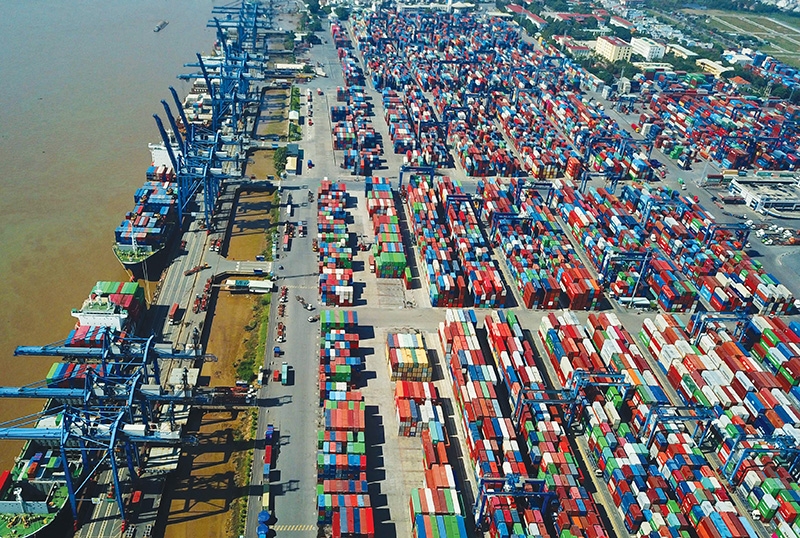Looking back to plan for a more resilient future
 |
| Raymond Mallon, senior economist |
Vietnam’s socioeconomic performance since 1975 is recognised internationally as a remarkable development success story. From one of the world’s poorest countries, Vietnam has drastically reduced poverty and achieved middle-income status, with health and education outcomes typically seen in countries at much higher income levels.
Vietnam faced enormous post-war challenges. Nevertheless, it developed a relatively effective and equitable system for delivering public health and education services to most people. Broad-based improvements in human capability and relatively equitably distributed land use rights helped lay the foundations for reforms that generated relatively equitable outcomes.
Initial reforms after doi moi in 1986 included allowing farmers to use agricultural land to farm and to allow farm produce to be sold in the markets. Restrictions on small-scale private activity were lifted. The sector investment focus shifted from heavy industry to more labour-intensive agriculture, manufacturing, and services.
Macroeconomic stabilisation programmes also helped improve living standards, and provided the greater certainty needed to boost investment and trade. Such moves led to sharp increases in foreign direct investment and trade from the early 1990s.
Vietnam began to actively pursue regional and international trade and economic integration agreements. Membership of ASEAN in 1995 represented a key turning point in terms of Vietnam linking its future with the region. Vietnam acceded to the World Trade Organization in 2007 and has since signed a raft of regional and bilateral trade and economic cooperation agreements, including with the European Union, Japan, South Korea, and the United States.
Despite progress with private sector development, bureaucratic obstacles discouraged businesses from formally registering to grow and develop prior to the 2000 Law on Enterprises. Since the 2000s, business-related laws have been periodically amended, and administrative procedures gradually streamlined despite periodic setbacks. Government consultations with the business community to identify constraints has become more regular and systematic. This has facilitated the gradual emergence of formal domestic private and corporate sectors.
Domestic private output, employment, and exports have grown at a faster rate than both the state and foreign-invested players in the years prior up to 2020.
COVID-19 impacts and policy response
COVID-19 has slammed the brakes on recent decades of progress. It has negatively impacted businesses because of reduced the demand for goods and services due to reduced mobility, labour constraints, supply chain disruptions, tightening of credit and declining investment. Many people working in the informal sector, hospitality, and other contact intensive industries have lost employment and/or incomes, and domestic private businesses, have been hit hard. Some of the most vulnerable social groups have been worst affected.
The recent outbreak and resulting lockdowns are imposing further brakes on social mobility, public and business investment, and economic performance. Accessing vaccine supplies, and rolling out the vaccination programme, remain high priorities.
On the other hand, relatively effective management of the pandemic has meant that the Vietnamese economic performance has so far been surprisingly resilient. The shift to a digital economy has accelerated. And the fiscal situation means that government is relatively well placed to increase public expenditure to address priority needs.
Government and non-government as well as social organisations have been providing food and other resources to those most in need. But social protection measures aimed at mitigating the impacts on households and businesses - including income support and wage subsidies for households and businesses - have not always met the needs of the worst affected. Support could be extended to better help those most in need during these most difficult times. Budget transfers targeting the informal sector, the unemployed, and low-income workers are likely to have a stronger impact in stimulating the economy than providing tax relief to businesses.
Further accelerating public investment and other expenditures is a priority to both stimulate the economy in the short term, and to build the foundations for future sustained investment and improvements in living standards. Policymakers may want to consider bringing forward salary increases for the lowest-paid public employees, including healthcare and teaching staff. Such measures could have a strong stimulatory impact on the broader economy.
 |
| With quality infrastructure and logistics, Vietnam’s economic potential increases exponentially |
Post-pandemic recovery
Recovery efforts need not wait until public health risks have subsided. Immediate concerns in planning for the future include sustaining poverty reduction and productivity growth in a challenging global economy, improving public sector efficiency, addressing climate change, air pollution, and other environmental challenges, an ageing population age, and lingering pandemic related inequities.
The crisis has demonstrated the vital importance of effective public service delivery, the need to develop more broad-based social protection mechanisms, and the opportunities provided by digital technology. Policymakers could explore opportunities to further build on Vietnam’s existing strengths in these areas.
Achieving broad-based productivity growth will be essential for improving living standards and to generate the resources needed to achieve social objectives. Continuing progress in public health, and in developing vocational training, higher education, and life-long learning opportunities, while continuing to strengthen the relevance of primary and secondary education, can help accelerate productivity growth. Given its growing importance, increasing attention needs to be given to digital literacy.
Productivity gaps between informal and formal employment, between women and men, between rural and urban areas, and between different sectors also need to be addressed. Reducing productivity gaps could boost growth, generate more benefits for marginalised groups, and promote more equitable and cohesive society.
This will require further strengthening of public expenditure efficiency, reducing corruption and adjusting resource allocations to reflect the needs of an increasingly urbanised and middle-class society, and an increasingly sophisticated economy. This will be increasingly important as the population begins to age and workforce participation rates start to decline in the coming decades. Digitalisation, transparency and measurable targets -- including benchmarking Vietnam’s performance with neighbouring countries -- has proved to be an effective approach to holding government agencies accountable for delivering substantive improvements.
Sustained efforts to enhance the competitiveness of domestic private enterprises will also be an essential element of economic recovery efforts. Strong and independent economic regulators (for example, for competition, energy, and telecoms), can help to better protect individual and property rights and the environment, and to strengthen transparency, corporate governance, and accountability mechanisms. Stronger social organisations, independent of vested interests, could help to better protect the rights of consumers and workers. Continued engagement with the business community, workers, and educators to identify and address institutional and other bottlenecks can play an important role in sustaining strong investment growth.
Better environmental infrastructure and management are also needed to sustain improvements in productivity. Greater attention could be given to ameliorating the impacts of climate change when planning infrastructure development. More environmentally-friendly infrastructure planning can help to address the increasing waste management and pollution challenges resulting from urban development and agglomeration.
With quality infrastructure and services, the potential scale economy benefits from urban agglomeration are substantial. Developing urban clusters will help facilitate technology transfer and nurture the development of a creative and innovation-led economy. However, urbanisation needs to be managed carefully to ensure equitable outcomes and better living environments. And anticipated innovations will disrupt the status quo generating new opportunities, but also creating costs for some social groups. Support may be needed to help those adversely impacted to find new opportunities.
More generally, the growing middle-income population will demand more effectively enforced pollution controls and environmental management, and better living environments, including increased green areas. Improved living environments will also help attract and retain the best possible national and international expertise need to develop an innovative and competitive economic system.
Vietnam remains well placed to emerge from the pandemic crisis in a better situation than many countries. Consultative, evidence-based, and transparent policy-making processes can facilitate equitable and quality outcomes from economic recovery initiatives.
What the stars mean:
★ Poor ★ ★ Promising ★★★ Good ★★★★ Very good ★★★★★ Exceptional
Themes: COVID-19
- 67 million children missed out on vaccines because of Covid: UNICEF
- Vietnam records 305 COVID-19 cases on October 30
- 671 new COVID-19 cases recorded on October 1
- Vietnam logs additional 2,287 COVID-19 cases on Sept. 21
- People’s support decisive to vaccination coverage expansion: official
Related Contents
Latest News
More News
- State corporations poised to drive 2026 growth (February 03, 2026 | 13:58)
- Why high-tech talent will define Vietnam’s growth (February 02, 2026 | 10:47)
- FMCG resilience amid varying storms (February 02, 2026 | 10:00)
- Customs reforms strengthen business confidence, support trade growth (February 01, 2026 | 08:20)
- Vietnam and US to launch sixth trade negotiation round (January 30, 2026 | 15:19)
- Digital publishing emerges as key growth driver in Vietnam (January 30, 2026 | 10:59)
- EVN signs key contract for Tri An hydropower expansion (January 30, 2026 | 10:57)
- Vietnam to lead trade growth in ASEAN (January 29, 2026 | 15:08)
- Carlsberg Vietnam delivers Lunar New Year support in central region (January 28, 2026 | 17:19)
- TikTok penalised $35,000 in Vietnam for consumer protection violations (January 28, 2026 | 17:15)

 Tag:
Tag:

















 Mobile Version
Mobile Version